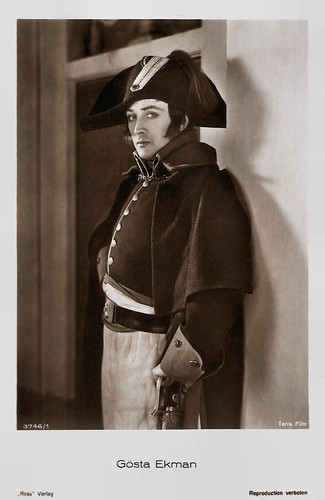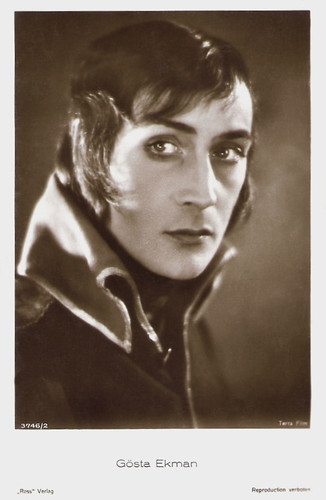
Danish postcard by Alex. Vincent's Kunstforlag, Eneret, no. 253. Photo: Diomira Jacobini and Gösta Ekman in Revolutionshochzeit/ The Last Night (A.W. Sandberg, 1927).

Danish postcard by Alex. Vincent's Kunstforlag, Eneret, no. 254. Photo: publicity still for Revolutionshochzeit/The Last Night (A.W. Sandberg, 1928). This was a German-Danish dramatisation of Sophus Michaëlis' play 'Revolutionsbryllup' (Revolutionary Wedding) and produced by Terra-Filmkunst. This card shows left Gösta Ekman and Karina Bell and in the back Fritz Kortner as the Jacobine Monteloup, and right Diomira Jacobini whose character, the aristocratic Alaine, has changed clothes with her maid Leontine (Karina Bell) to get a pass to leave Paris.
Paris in 1793, in the midst of the French Revolution
Revolutionshochzeit/Revolution Wedding (A.W. Sandberg, 1928) evolves in Paris in 1793, in the midst of the French Revolution. To fulfil her late father's last wish, the Comtesse Alaine de l'Estelle has become engaged to the noble Erneste de Tressailles.
Alaine de l’Estelle (Diomira Jacobini) and her maid Leontine (Karina Bell) try to flee Paris. Alaine is expected by her fiance, Ernest de Tresailles (Walter Rilla), at the castle of Trionville.
Erneste is fighting as a so-called émigré officer in the Austrian army against the Republicans. When Erneste is stationed near Alaine's castle of Trionville, he visits her in order to marry quickly. But that's when a Republican army led by the cold-hearted citizen-commissar Jacobine Monteloup (Fritz Kortner) invades the chateau and arrests Erneste.
As an émigré officer and enemy of the people, he is sentenced to death. In order to save Erneste, Alaine asks the good-natured Republican lieutenant Marc-Arron (Gösta Ekman) for help. He is a member of the Jacobines, who right after the marriage of Ernest and Alaine occupy Trionville.
For the love of Alaine, Marc tries to help Ernest and, consequently, is arrested and executed.

German postcard by Ross Verlag, no. 3746/1, 1928-1929. Photo: Terra Film. Gösta Ekman in the Revolutionshochzeit/Revolution Wedding (A.W. Sandberg, 1928).

German postcard by Ross Verlag, no. 3746/2, 1928-1929. Photo: Terra Film. Gösta Ekman in the Revolutionshochzeit/Revolution Wedding (A.W. Sandberg, 1928).
A still enjoyable film full of excitement
Revolutionshochzeit/Revolution Wedding (A.W. Sandberg, 1928) is an adaptation by Norbert Falk and Robert Liebmann of the 1906 play of the same name by Sophus Michaelis and was produced by the Berlin company Terra-Film AG. Filming took place in the Terra Glass House and the surrounding area of Paris.
After passing through the Reich film censors, who gave the film the rating "Volksbildend" (educating the people), it premiered in Berlin (Mozartsaal) on 3 October 1928. In the following weeks, it was shown in other European countries, and later worldwide.
Revolutionshochzeit/Revolution Wedding was described by contemporary critics as a "top work", a "great film" and a "great revolutionary film". In particular, the courage of the tragic ending and the performance of Gösta Ekman and the direction of Anders Wilhelm Sandberg were praised.
Hans Wollenberg in Lichtbild-Bühne, no. 239, 4.10.1928: A. W. Sandberg, the Danish director, not only proves to be a master of the magnificent, splendidly moving and animated mass scenes but rather, above the outer unfolding, devotes all his love to the inner human core and thus to the actual play scenes with the finest feeling for the unravelling of the human heart, makes his directorial achievement an artistic deed. One must realise the unusual tasks that this demanding subject confronted the director with in order to appreciate the rich and great art of interpretation to which it owes its realisation as a silent film.
Revolutionshochzeit/Revolution Wedding was popular with the public, but after the film had been shown in cinemas, it fell into oblivion. It took till 2010 for a print from Moscow to emerge at the film archive of Toulouse, which was sent to the Filmmuseum Potsdam, where it was restored and re-premiered in March 2011. It was considered then to have an overdose of pathos and heroism, but it is also an enjoyable film full of excitement.

German postcard by Ross Verlag, no. 3747/1, 1928-1929. Photo: Terra Film. Karina Bell in Revolutionshochzeit/The Last Night (A.W. Sandberg, 1928).

German postcard by Ross Verlag, no. 3748/1, 1928-1929. Source: Terra-Film. Diomira Jacobini in Revolutionshochzeit/The Last Night (A.W. Sandberg, 1928).
Sources: Bonn Stumfilmtage (German), Wikipedia (German) and IMDb.
No comments:
Post a Comment